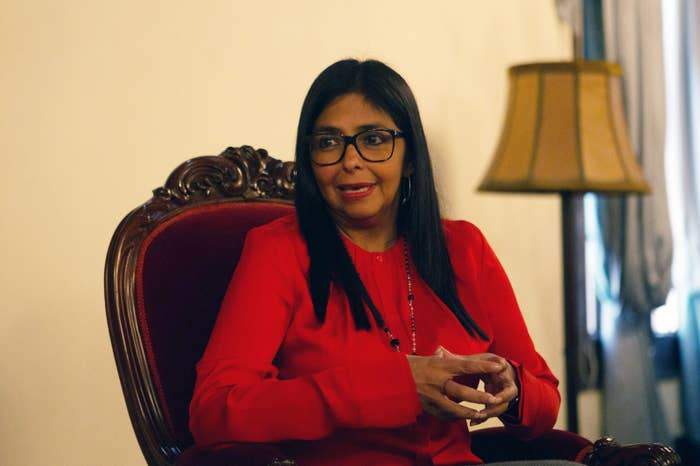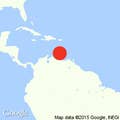
CARACAS, Venezuela — Venezuelan Foreign Minister Delcy Rodríguez told BuzzFeed News in an exclusive interview that things are not “fine” in the country and drew a comparison between Venezuela’s rising opposition movement, which has gained widespread regional sympathy, and the start of civil war in Syria.
“It happened in Syria, too," she said. "An opposition to a government, governments of other countries that are supporting the opposition to the Syrian government. Well, let’s look at how Syria ended up. A country that has been at war for six years now.”
Venezuela has been rocked by protests for two months, with demonstrators demanding a humanitarian channel for much-needed food and medicine to be allowed into the country, as well as early elections to challenge President Nicolás Maduro. Protests intensified after the Supreme Court stripped the opposition-controlled National Assembly of its powers in March, and then again after Maduro said he would convene a citizens' assembly to rewrite the constitution on Monday.
Rodríguez said the “international hysteria” over the situation in Venezuela has been created by international news outlets that don’t report on the problems in countries like Brazil, Mexico, and Paraguay. If “what is happening in Venezuela gives off the perception of schizophrenia, it would be multiplied over there," she added.
Maduro has blamed the crisis in Venezuela on an “economic war” waged from Washington, DC, to destabilize his government and usher in one that is friendly to American interests.
Other officials previously loyal to Maduro’s regime have begun assigning blame to the government.
Attorney General Luisa Ortega on Wednesday condemned the authorities’ heavy repression of protesters in an interview with the Wall Street Journal. At least 31 people have been killed during demonstrations in recent weeks. Ortega’s increasingly critical and public statements about the spiral of state-sponsored violence have led many to believe there may be a growing crack in government.
When asked about Ortega’s recent statements, Rodríguez dismissed the idea of reading too much into the attorney general's words, since the role is meant to be nonpartisan in Venezuela.
Yibrar Saab Fornino, the son of Venezuela’s pro-government human rights ombudsman, released a video last month saying he had been a victim of police repression. Wearing a plain white T-shirt, the 20-year-old looked straight into the camera, set up in an external, undisclosed location. “Dad… Do what’s right.”
Protests in Caracas have recently spilled over to the western parts of the city, known as a pro-government stronghold.
As international pressure has grown, the Venezuelan government has pushed back; Rodríguez announced Venezuela was leaving the Organization of American States after the international body called a special session to discuss how to restore democracy to the oil-rich South American nation.
Governments around the region have expressed growing concern; several US congressmen have called for new sanctions and for providing humanitarian aid to Venezuela.
Maduro’s government, however, appears to want to keep the US at arm’s length.
"President Trump made a campaign promise, a promise which surprised the whole world, that was against interventionism from the US in any part of the world," she said. "We hope he keeps this electoral promise."
Rodríguez pointed out that Venezuela, too, is offended over the wall Trump plans to build along the Mexican border. “That is not just a wall against Mexico, it's a wall against all of Latin America and the Caribbean," said Rodríguez.
Two allies Venezuela is open to? Russia and Cuba.
The foreign minister, who praised Russia’s deepening political and economic involvement in the country, said Cuba is an example for Venezuela, especially in relation to its OAS departure.
"If you think about it, five or six decades later, many of the governments that accused Cuba are now asking for relations to be re-established, asking it to resume commercial and economic ties. It cost five or six decades for them to realize the historic error that the exclusion from the OAS meant.”

